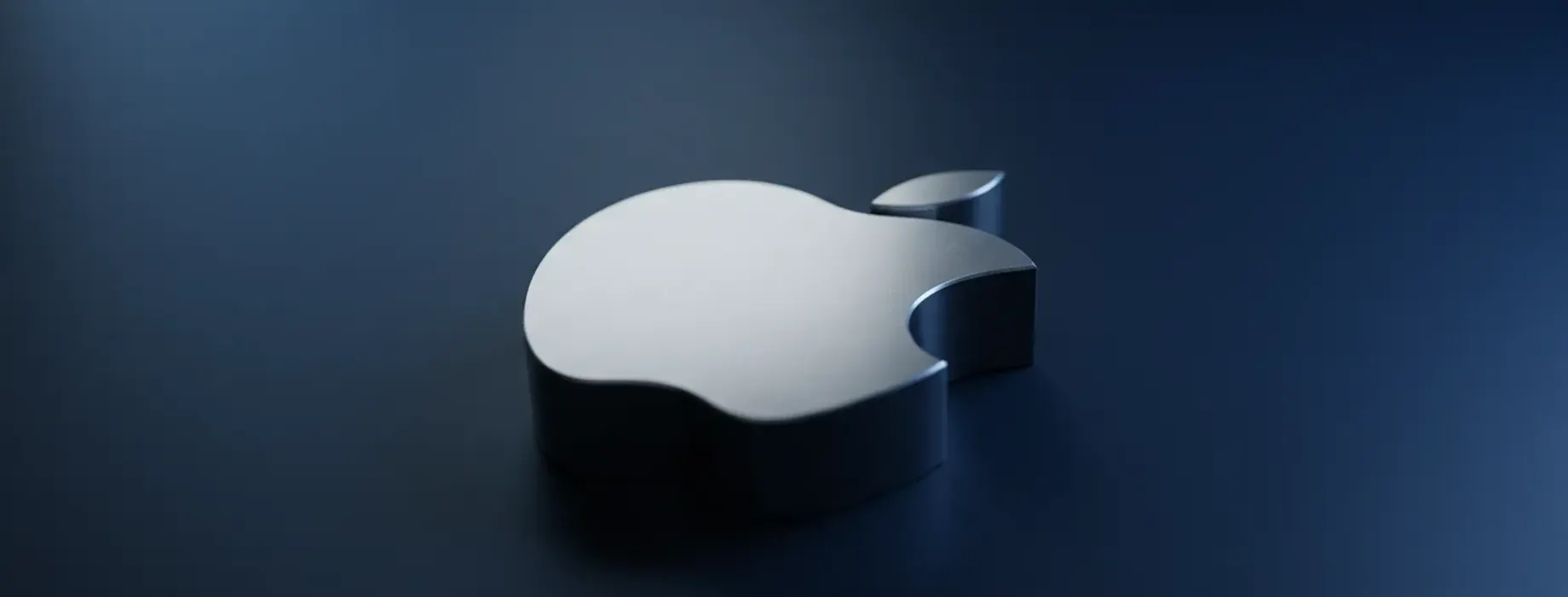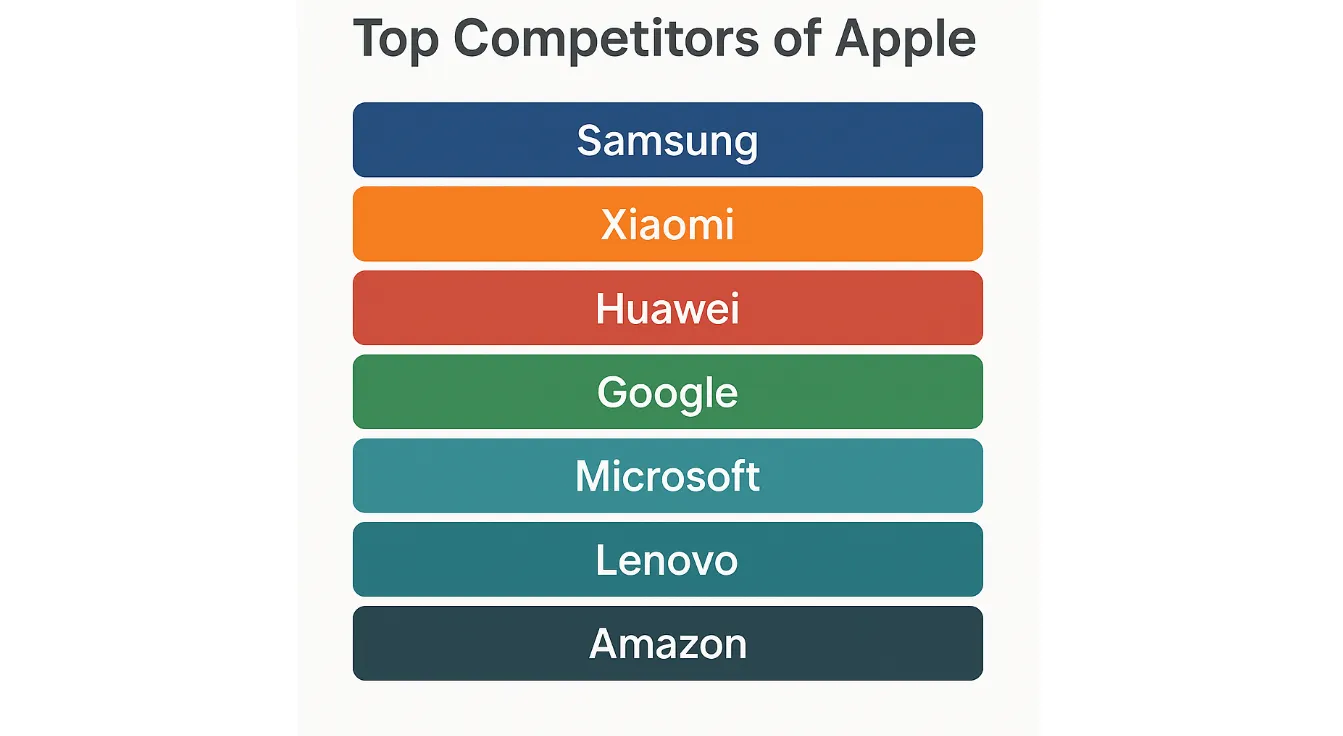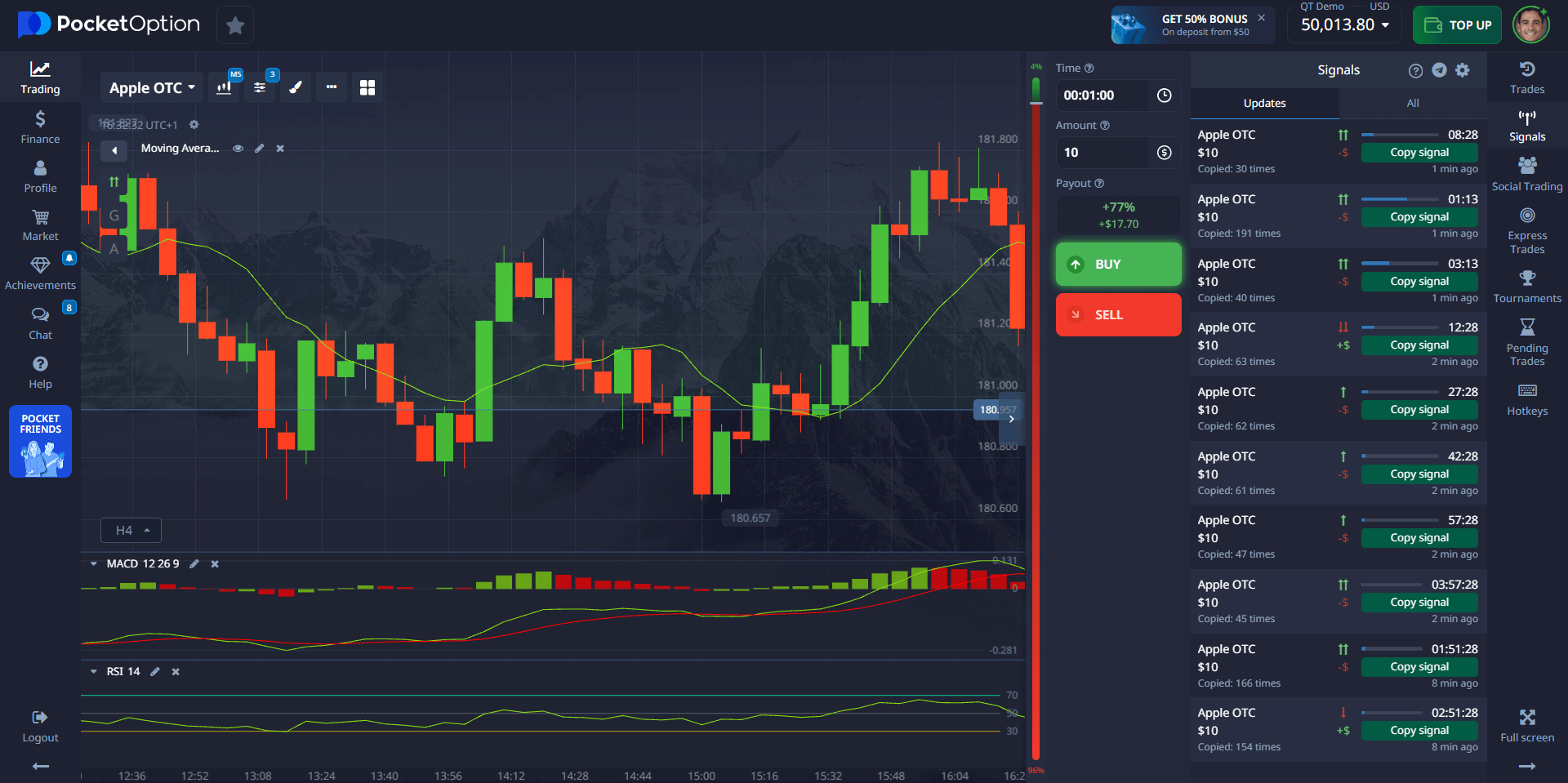- Samsung holds a strong global position with 22.7% share
- Its Galaxy lineup spans entry to premium; innovations like foldable displays and the Galaxy AI suite threaten Apple’s iOS.
- “While Apple has pulled ahead in unit sales, they remain close rivals… Apple has the advantage of its own ecosystem, while Samsung is limited by Android.”
Top 3 Competitors of Apple: A Deep Dive into the Market in 2025

Apple leads with 26.9% smartphone market share, but competitors like Samsung and Xiaomi are close behind. Discover key insights for trading Apple and other top tech stocks on Pocket Option.
Article navigation
- Try Start Apple trading from $1 today
- What Makes a Competitor of Apple?
- 📊 Market Overview: Apple vs the Competition
- Top 3 Competitors of Apple in 2025
- Other Significant Apple Competitors
- Apple’s Competitive Edge
- Expert Insights & Market Commentary
- Multi-Dimensional Comparison of apple top 3 competitors
- Strategic Trade Insight: Quick Trading on Pocket Option
- Testimonials from Pocket Option Traders
- Recommendations & Insights
- What the Top 3 competitors of Apple worldwide Reveal for Traders
- Final Thoughts
What Makes a Competitor of Apple?
Apple’s reach spans hardware (iPhone, Apple Watch, Mac), software ecosystems (iOS, watchOS, App Store), and services (Apple Music, iCloud). Therefore, competitors of Apple company aren’t limited to smartphone makers—they include PC manufacturers, streaming platforms, and wearables firms.
📊 Market Overview: Apple vs the Competition
When examining apple biggest competitors, it’s clear that Samsung remains at the top due to its product diversity, market share, and innovation in hardware and AI.
Global Smartphone Market Share Q4 2024 or Apple competitors in smartphone industry
| Manufacturer | Shipment Volumes (Q4 2024) | Global Share |
|---|---|---|
| Apple | 77.1 M | 23 % |
| Samsung | 51.9 M | 16 % |
| Xiaomi | 42.7 M | 13 % |
For the full year 2024, both Apple and Samsung captured 18% each of the smartphone market
As of May 2025, Apple holds 26.9% and Samsung 22.7% in global mobile vendor share
In the US specifically, as of September 2024, Apple has the largest smartphone market share at 57.4%, dwarfing Samsung’s 23.3%
Top 3 Competitors of Apple in 2025
As we analyze who are Apple’s main competitors, three names consistently stand out—Samsung, Xiaomi, and Huawei—each challenging Apple’s dominance in different ways. Let’s take a look at Apple competitors analysis.
1. Samsung – Why It’s Apple’s Biggest Competitor
Market Position and Strategy
Smartphone & Wearable Competition
- Samsung’s Galaxy Watch series is a direct rival to the Apple Watch.
- Galaxy AI and Tizen-powered wearables boost Samsung’s competitive edge.
Why Samsung is Apple’s main competitor of Apple
With broad pricing tiers, aggressive AI integration, and a global supply chain advantage (e.g. tariff resilience via Vietnam production), Samsung remains the biggest and most direct competitor to Apple—tying hardware muscle with ecosystem growth.
2. Xiaomi – The Emerging Challenger
As one of the fastest-growing competitors of Apple iPhone, Xiaomi offers high-performance smartphones with aggressive pricing, making it especially dominant in markets like India, SEA, and parts of Europe.
- Xiaomi shipped ~168.6 M units in 2024 (14% market share), making it the third-largest smartphone vendor
- It’s gaining in emerging markets like India and Latin America through low-cost, feature-packed devices.
Xiaomi vs Apple
Although it’s not a top 3 competitor of Apple in the premium tier, Xiaomi is a formidable force in mid-range markets, challenging Apple’s growth—especially as Apple launches discounted models (e.g. iPhone SE, older iPhone)
3. Huawei (and HarmonyOS) – The Wildcard
- Huawei’s HarmonyOS grew to a 5% global market share by Q1 2025
- Though limited by sanctions, its R&D continues, including innovations like the Mate XT foldable
Why Huawei matters
Huawei is a rising indirect competitor of Apple due to its resurgence in China and rapid expansion of its own OS ecosystem.
Other Significant Apple Competitors
While the top 3 competitors of Apple dominate global headlines, a broader set of challengers exerts targeted pressure across Apple’s diverse ecosystem. These indirect but potent competitors shape Apple’s innovation roadmap and influence trading opportunities.

🔍 Google: A Rising Threat in AI and Smartphones
- Pixel Series: Although Google holds just ~5% of the US smartphone market, its Pixel devices showcase the full power of Android, directly challenging the iPhone on software and AI integration.
- Gemini AI vs Siri: With Gemini-powered features integrated across Pixel and Android OS, Google is redefining the AI-smartphone interface, pressuring Apple to accelerate Siri and Apple Intelligence updates.
“Google is now competing with Apple on software quality—Pixel delivers a cleaner, more AI-intelligent experience that appeals to early adopters.” — Mark Spoonauer, TechRadar
Trading Insight: Watch for spikes in GOOG shares around Pixel launches or AI announcements—ideal for Quick Trading setups.
🖥️ Microsoft: The Underrated Ecosystem Rival
- Surface vs Mac: Microsoft’s Surface line, including the Surface Pro and Surface Laptop, directly challenges MacBooks in design and productivity.
- Windows + Copilot AI: With the integration of Copilot across Office and Windows 11, Microsoft leads the enterprise AI wave.
“Microsoft has become Apple’s biggest rival in productivity tech—especially in the hybrid work era.” — Angela Beltan, Forrester
Impact for Traders: MSFT’s performance can inversely correlate with Apple during enterprise-centric product cycles. Quick Trade both to hedge or capitalize on sector shifts.
💻 Lenovo, Dell, ASUS: Leaders in the PC Market
- Global Shipments: Lenovo (23.5%), HP (20.8%), and Dell (15.9%) dominate global PC shipments, while Apple holds around 8.6% (2024 IDC data).
- Tablets and Chromebooks: Competing aggressively with iPads, especially in education and budget segments.
These firms represent companies similar to Apple in hardware offering but differ significantly in OS and pricing strategy.
Opportunity: These competitors tend to outperform during back-to-school and Black Friday seasons—consider sector ETF Quick Trades or individual stock plays.
🔥 Amazon: Competing on Services and Devices
- Fire Tablets: While not direct iPad killers, Amazon’s budget Fire tablets dominate the entry-level tablet space, especially during sales.
- Amazon Music: Ranks third in global music subscriptions (13.3%) after Spotify (31%) and Apple Music (15%) as of Q1 2025 (MIDiA Research).
Amazon challenges Apple in both hardware and digital services by leveraging its ecosystem and aggressive pricing.
Expert View: “Amazon is building a shadow ecosystem to Apple—cheaper but sticky, especially for Prime users.” — Emily White, SoundExchange Board Member
Quick Trading Angle: AMZN is volatile around Prime Day and Q4 holiday earnings—watch for patterns that inversely reflect AAPL performance.
🎵 Spotify & Amazon Music: The Battle for Streaming Loyalty
- Spotify: With over 600M monthly users, Spotify remains the leading music platform, despite Apple Music’s tighter ecosystem integration.
- Amazon Music: Bundled with Prime, it’s surging in tier-2 markets.
While Apple Music benefits from native integration, it faces fierce competition in algorithmic personalization, podcasting, and subscription flexibility.
Market Note: Music services growth affects Apple’s Services revenue—a major contributor to stock sentiment. Service revenue surprises = trading signals.
Depending on the market segment—premium phones, wearables, services, or AI—who is the competitor of Apple can vary from Samsung and Xiaomi to Spotify or Microsoft.
Apple’s Competitive Edge
- Services Growth: App Store and Services revenue continue to rise—12.9% growth expected in recent fiscal quarter
- Device Integration: iPhone + Apple Watch + ecosystem delivers a cohesive user experience Spotify and others can’t touch.
- Premium Positioning: Maintains brand reputation globally even as market share dips slightly (from 19% to 18% in 2024)
Expert Insights & Market Commentary
- “Post‑WWDC Apple Intelligence announcements triggered upgrades from iPhone 12/13 users… Apple’s India production strategy has streamlined supply and spurred demand.” —Le Xuan Chiew, Canalys analyst
- “AI is the new tech innovation; Apple lagging behind Samsung and Google in AI integration is a key reason for their weakened positioning” —Jane Hepburne Scott, Aegon Asset Management
- “Huawei’s HarmonyOS now claims 5% global share—an indirect but growing competitor.”
Multi-Dimensional Comparison of apple top 3 competitors
Feature Matrix
| Competitor | Hardware Range | Ecosystem Strength | Key Innovation | Market Strength |
|---|---|---|---|---|
| Apple | Premium only | Very strong | iOS, Services, AI | 26.9% global; 57% US |
| Samsung | Budget–Premium | Strong (Android) | Galaxy AI, Foldables | 22.7% global; 2nd in US |
| Xiaomi | Budget–Mid-range | Growing (MIUI) | Value-for-money | 14% global |
| Huawei | Mid–Premium | HarmonyOS | OS innovation, foldables | 5% global |
Strategic Trade Insight: Quick Trading on Pocket Option
Quick Trading simplifies market engagement: press Buy if you foresee a rise in Apple stock, Sell if a drop is expected.
Example Apple Trade: On June 15, AAPL closed at $165. Anticipating a positive earnings surprise, a trader opened a Buy at $165. Once the report beat expectations and stock hit $170, the Quick Trade closed with a +3% profit.
Trade 100+ assets—including Apple, Samsung, Google—24/7 on Pocket Option. Access live charts, competitive spreads, and responsive interface—all optimized for an active trading style.

Testimonials from Pocket Option Traders
- “I started using Quick Trading Apple on Pocket Option – its copy trading and simple user interface helped me make profits.” — Daniel M.
- “Trading global tech names like AAPL alongside Forex on Pocket Option gives me flexibility and edge.” — Sophia R.

Recommendations & Insights
- Diversification Strategy: Trade stocks outside of Apple, such as Samsung during the Galaxy launch phase or Xiaomi in emerging markets..
- Monitor Analytics & AI Trends: Track developments like Galaxy AI vs Apple Intelligence to anticipate market-moving competitive shifts.
- Market Share Watch: When Apple’s share dips (e.g. China fell to 17% vs Samsung 23%) setup strategic trades using Quick Trading for both relief rallies and continued weakness.
What the Top 3 competitors of Apple worldwide Reveal for Traders
- Samsung: The biggest Apple competitor—diverse range, strong AI push, reliable target for tech-focused strategies.
- Xiaomi: Rising challenger—lower-cost segment, great for regional and momentum-based Quick Trades.
- Huawei: Indirect but crucial—HarmonyOS growth offers unique trading angles even under sanctions.
Pocket Option offers fast, instant trades on 100+ stocks, giving traders the flexibility to take advantage of earnings, product launches and macroeconomic changes..
Final Thoughts
Apple remains a tech giant, but competitors of Apple like Samsung, Xiaomi, and Huawei are eating into its turf. A blend of premium branding, ecosystem integration, and AI-enabled services keeps Apple at the top, but trading-wise, market fluctuations around these players create daily opportunities. Stay informed and trade smart—know the top 3 competitors of Apple, understand market dynamics, and take action with Pocket Option’s platform. For traders on Pocket Option, the evolving apple competition creates ongoing short-term opportunities to trade AAPL and its rivals during earnings seasons, product launches, or regulatory changes.
FAQ
Who are Apple's 3 biggest competitors?
As of 2025, Apple’s three biggest competitors are Samsung, Xiaomi, and Huawei. Samsung stands out as Apple’s closest rival in smartphones, wearables, and technological innovation. Xiaomi, rapidly expanding across Asia and other emerging markets, dominates the mid-range smartphone segment. Huawei, although impacted by international sanctions, maintains strong influence through its HarmonyOS and a solid foothold in the Chinese domestic market. Together, these companies challenge Apple across mobile technology, ecosystem integration, and competitive pricing.
Who was Apple's first competitor?
Apple’s first competitor was IBM, dating back to the early 1980s when Apple launched the Macintosh to challenge IBM’s PC dominance. Later, Microsoft became a primary competitor during the desktop OS wars with Windows vs macOS. These rivalries shaped Apple’s early innovation trajectory and branding.
Who is Apple's competitive rivalry?
Apple's competitive rivalry spans both direct and indirect domains. Direct rivals include Samsung (hardware), Microsoft (PCs, cloud), and Google (Pixel phones, Android). Indirectly, companies like Spotify, Amazon, and Xiaomi affect Apple’s ecosystem dominance in services, voice assistants, and smart devices. This multifaceted rivalry pushes Apple to continuously innovate and expand.
Who is Big Apple competitor?
The Big Apple competitor today is clearly Samsung. With a 22.7% global smartphone market share and strong positions in AI, foldables, and wearables, Samsung rivals Apple across almost every major tech vertical. Their competition defines much of the innovation and pricing trends in the mobile market.
What is Apple market share in 2025?
The Apple market share in the global smartphone industry is approximately 26.9% as of mid-2025, according to Statcounter. In the U.S. specifically, Apple holds a dominant 57.4% market share. The company also commands around 8.6% of global PC shipments and maintains over 15% of the global music streaming subscription base via Apple Music. This market position reflects Apple’s strength across multiple verticals, not just mobile devices.
Who are the indirect competitors of Apple?
Indirect competitors of Apple include companies not directly producing smartphones or computers but challenging Apple through other verticals. Examples include Spotify and Amazon Music (rivaling Apple Music), Microsoft’s ecosystem (vs iCloud and productivity tools), and even Amazon’s Fire tablets in the budget segment. These firms affect Apple’s user engagement, retention, and ecosystem dominance—making them strategic threats beyond hardware.
Top 3 competitors of Apple 2021 — are they still relevant today?
The top 3 competitors of Apple in 2021 were Samsung, Huawei, and Xiaomi. In 2025, Samsung remains Apple’s biggest rival, while Xiaomi continues to grow in mid-tier markets. Huawei, though limited internationally, has gained domestic momentum with HarmonyOS. So yes, the 2021 lineup still holds relevance—but with varying degrees of impact based on region and innovation.
Why is Samsung Apple's biggest competitor?
Samsung is considered Apple’s biggest competitor due to its massive global presence, diverse product portfolio, and technological innovations. Unlike Apple, which focuses on the premium market, Samsung covers every price segment—from budget to flagship—with its Galaxy line. Additionally, Samsung’s early adoption of foldable technology and strong integration of Galaxy AI tools keeps it ahead in innovation cycles. Their head-to-head rivalry in smartphone sales, especially in Q4 2024, makes the case clear.